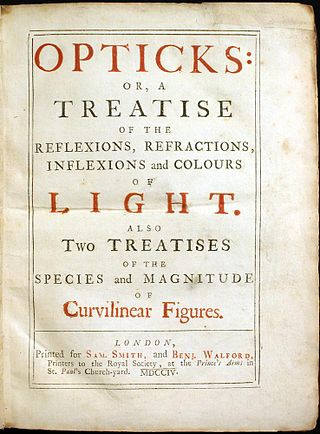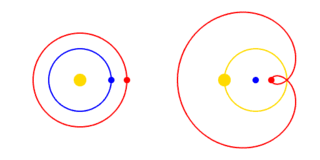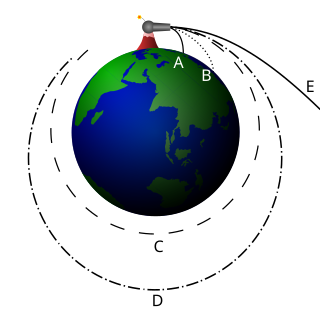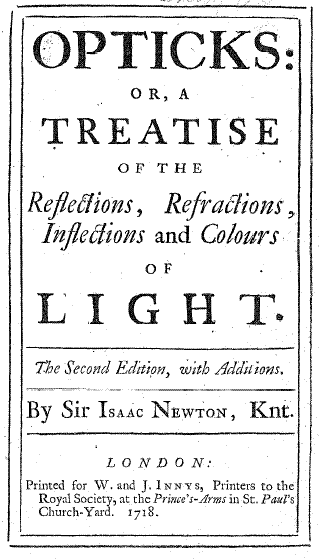Related Research Articles

Sir Isaac Newton was an English polymath active as a mathematician, physicist, astronomer, alchemist, theologian, and author who was described in his time as a natural philosopher. He was a key figure in the Scientific Revolution and the Enlightenment that followed. His pioneering book Philosophiæ Naturalis Principia Mathematica, first published in 1687, consolidated many previous results and established classical mechanics. Stephen Hawking called Principia "probably the most important single work ever published in the physical sciences". He also made seminal contributions to optics, and shares credit with German mathematician Gottfried Wilhelm Leibniz for formulating infinitesimal calculus, though he developed calculus years before Leibniz. He is credited with laying the foundations of modern science.
Inertia is the natural tendency of objects in motion to stay in motion and objects at rest to stay at rest, unless a force causes the velocity to change. It is one of the fundamental principles in classical physics, and described by Isaac Newton in his first law of motion. It is one of the primary manifestations of mass, one of the core quantitative properties of physical systems. Newton writes:
LAW I. Every object perseveres in its state of rest, or of uniform motion in a right line, except insofar as it is compelled to change that state by forces impressed thereon.

Philosophiæ Naturalis Principia Mathematica often referred to as simply the Principia, is a book by Isaac Newton that expounds Newton's laws of motion and his law of universal gravitation. The Principia is written in Latin and comprises three volumes, and was authorized, imprimatur, by Samuel Pepys, then-President of the Royal Society on 5 July 1686 and first published in 1687.
Newton's law of universal gravitation states that every particle attracts every other particle in the universe with a force that is proportional to the product of their masses and inversely proportional to the square of the distance between their centers. Separated objects attract and are attracted as if all their mass were concentrated at their centers. The publication of the law has become known as the "first great unification", as it marked the unification of the previously described phenomena of gravity on Earth with known astronomical behaviors.
The year 1729 in science and technology involved some significant events.
In science, an experimentum crucis is an experiment capable of decisively determining whether or not a particular hypothesis or theory is superior to all other hypotheses or theories whose acceptance is currently widespread in the scientific community. In particular, such an experiment must typically be able to produce a result that rules out all other hypotheses or theories if true, thereby demonstrating that under the conditions of the experiment, those hypotheses and theories are proven false but the experimenter's hypothesis is not ruled out.

Opticks: or, A Treatise of the Reflexions, Refractions, Inflexions and Colours of Light is a collection of three books by Isaac Newton that was published in English in 1704. The treatise analyzes the fundamental nature of light by means of the refraction of light with prisms and lenses, the diffraction of light by closely spaced sheets of glass, and the behaviour of color mixtures with spectral lights or pigment powders. Opticks was Newton's second major work on physical science and it is considered one of the three major works on optics during the Scientific Revolution. Newton's name did not appear on the title page of the first edition of Opticks.

The scholarly method or scholarship is the body of principles and practices used by scholars and academics to make their claims about their subjects of expertise as valid and trustworthy as possible, and to make them known to the scholarly public. It comprises the methods that systemically advance the teaching, research, and practice of a scholarly or academic field of study through rigorous inquiry. Scholarship is creative, can be documented, can be replicated or elaborated, and can be and is peer reviewed through various methods. The scholarly method includes the subcategories of the scientific method, with which scientists bolster their claims, and the historical method, with which historians verify their claims.

Absolute space and time is a concept in physics and philosophy about the properties of the universe. In physics, absolute space and time may be a preferred frame.
De motu corporum in gyrum is the presumed title of a manuscript by Isaac Newton sent to Edmond Halley in November 1684. The manuscript was prompted by a visit from Halley earlier that year when he had questioned Newton about problems then occupying the minds of Halley and his scientific circle in London, including Sir Christopher Wren and Robert Hooke.

The Copernican Revolution was the paradigm shift from the Ptolemaic model of the heavens, which described the cosmos as having Earth stationary at the center of the universe, to the heliocentric model with the Sun at the center of the Solar System. This revolution consisted of two phases; the first being extremely mathematical in nature and the second phase starting in 1610 with the publication of a pamphlet by Galileo. Beginning with the 1543 publication of Nicolaus Copernicus’s De revolutionibus orbium coelestium, contributions to the “revolution” continued until finally ending with Isaac Newton’s work over a century later.
In science, an effective theory is a scientific theory which proposes to describe a certain set of observations, but explicitly without the claim or implication that the mechanism used by the theory has a direct counterpart in the actual causes of the observed phenomena to which the theory is fitted. That means that the theory proposes to model a certain effect, without proposing to model adequately any of the causes which contribute to the effect.
The history of scientific method considers changes in the methodology of scientific inquiry, as distinct from the history of science itself. The development of rules for scientific reasoning has not been straightforward; scientific method has been the subject of intense and recurring debate throughout the history of science, and eminent natural philosophers and scientists have argued for the primacy of one or another approach to establishing scientific knowledge.
Jan Tesánek (1728–1788) was a Bohemian scholar and author of scientific literature.

Newton's cannonball was a thought experiment Isaac Newton used to hypothesize that the force of gravity was universal, and it was the key force for planetary motion. It appeared in his posthumously published 1728 work De mundi systemate.
Mechanical explanations of gravitation are attempts to explain the action of gravity by aid of basic mechanical processes, such as pressure forces caused by pushes, without the use of any action at a distance. These theories were developed from the 16th until the 19th century in connection with the aether. However, such models are no longer regarded as viable theories within the mainstream scientific community and general relativity is now the standard model to describe gravitation without the use of actions at a distance. Modern "quantum gravity" hypotheses also attempt to describe gravity by more fundamental processes such as particle fields, but they are not based on classical mechanics.
The General Scholium is an essay written by Isaac Newton, appended to his work of Philosophiæ Naturalis Principia Mathematica, known as the Principia. It was first published with the second (1713) edition of the Principia and reappeared with some additions and modifications on the third (1726) edition. It is best known for the "Hypotheses non fingo" expression, which Newton used as a response to some of the criticism received after the release of the first edition (1687). In the essay Newton not only counters the natural philosophy of René Descartes and Gottfried Leibniz, but also addresses issues of scientific methodology, theology, and metaphysics.

Newtonianism is a philosophical and scientific doctrine inspired by the beliefs and methods of natural philosopher Isaac Newton. While Newton's influential contributions were primarily in physics and mathematics, his broad conception of the universe as being governed by rational and understandable laws laid the foundation for many strands of Enlightenment thought. Newtonianism became an influential intellectual program that applied Newton's principles in many avenues of inquiry, laying the groundwork for modern science, in addition to influencing philosophy, political thought and theology.

A hypothesis is a proposed explanation for a phenomenon. For a hypothesis to be a scientific hypothesis, the scientific method requires that one can test it. Scientists generally base scientific hypotheses on previous observations that cannot satisfactorily be explained with the available scientific theories. Even though the words "hypothesis" and "theory" are often used interchangeably, a scientific hypothesis is not the same as a scientific theory. A working hypothesis is a provisionally accepted hypothesis proposed for further research in a process beginning with an educated guess or thought.
References
- ↑ Isaac Newton (1726). Philosophiae Naturalis Principia Mathematica , General Scholium. Third edition, page 943 of I. Bernard Cohen and Anne Whitman's 1999 translation, University of California Press ISBN 0-520-08817-4, 974 pages.
- ↑ Whewell, William (1840). The Philosophy of the Inductive Sciences. London. p. 438.